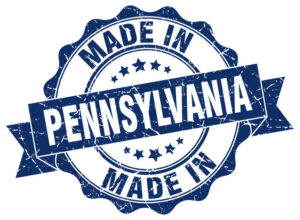Written by Rebecca Turley

Pennsylvania has long been a hub for industrialization. East, west and the valleys in between, Pennsylvania’s landscapes and skylines have been inexorably shaped by the Industrial Age. From Pittsburgh, where iron and steel production earned it the “Steel City” moniker and the title as the top producer of steel in the nation to Philadelphia, which was a powerhouse for the textile industry for more than a century, Pennsylvania has been a leader in innovation and industry.
And while you won’t see any more smokestacks lining the rivers in Pittsburgh or many steam locomotives weaving their way through Allentown and Bethlehem, you’ll still find a thriving manufacturing sector that’s taken aim at some of the most advanced products today.
Pittsburgh has become a big name in advanced manufacturing, with robotics and artificial intelligence being just a couple of the emerging industry players here. The region’s tech industry accounts for more than 13 percent of all U.S. technology companies.
The state’s Lehigh Valley is still rich in manufacturing, too. In fact, manufacturing accounts for 16.5 percent of the Valley’s economy, with the life sciences sector here showing the strongest growth.
The Lehigh Valley has also become a global hub for the logistics and warehousing industry. Thanks to its direct routes to the major metropolises of New York and Philadelphia, the Lehigh Valley (which spans a sprawling 726 square miles), has become a center for logistics and transportation. Trucks here can reach more than 100 million people in just a day’s drive. Some of the nation’s biggest players in ecommerce like Amazon and Walmart have set up shop here, choosing the Lehigh Valley as a prime location for their warehouses, fulfillment centers, and freight services.
And it’s showing no signs of slowing down. In fact, between 2015 and 2021, regional officials approved more than 29 million square feet of new warehouse space. The Lehigh Valley Economic Development Corporation recently reported that the region now ranks among the top five markets in the nation for industrial space under construction as a percentage of total industrial space. It’s estimated that this surge in warehousing here has created no less than 30,000 jobs in distribution and logistics – that’s more than 11 percent of the region’s workforce.
Jobs in supply chain and logistics enjoy a strong presence in Pennsylvania. Whether you’re engaged in the manufacturing, distributing, warehousing, or transportation segment of the supply chain, you’ll find a vast array of jobs in SCM and leadership here. To match, you’ll also find a wealth of supply chain management degrees both online and right here in Pennsylvania that will prepare you to take the global supply chain by the horns. Newcomers find value in earning a bachelor’s, while career changers and practicing supply chain managers in Pennsylvania more often set their sights on master’s degrees and MBAs in supply chain management.
Pennsylvania’s World Class Manufacturing Sector
 Pennsylvania’s manufacturing sector is alive and well, and the state’s legislators want to keep it that way.
Pennsylvania’s manufacturing sector is alive and well, and the state’s legislators want to keep it that way.
Manufacturing PA Initiative is the newest program for strengthening Pennsylvania’s manufacturing community through resources, strategic partnerships, job training, and career pathways. The ultimate goal of the program is to encourage innovation and commercialization and solidify a strong, 21st century workforce.
This program, which was created by the Pennsylvania Department of Community and Economic Development in 2017, builds upon the state’s robust workforce and established infrastructure to provide new training and workforce development opportunities to bolster the state’s manufacturing industry.
Program partners include the NIST Manufacturing Extension Partnership and many colleges, universities, technical training schools, and nonprofit organizations.
In July 2021, the state also launched the Pennsylvania Manufacturing Advisory Council to call attention to the state’s manufacturing industry and create a stronger voice for the thousands of manufacturers who call Pennsylvania home.
The Manufacturing PA Initiative provides support and resources three ways:
- The Pennsylvania Manufacturing Training-to-Career Grant program – Allows companies to identify and train a skilled workforce for future growth. Grants are awarded to those manufacturers who partner with institutions of higher learning (trade schools, community colleges) and nonprofit organizations to develop workforce development programs.
- The Pennsylvania Manufacturing Innovative Program – This program is designed to draw upon science and engineering talent in the state’s colleges and universities to ensure that Pennsylvania remains an international leader in manufacturing. This program includes the Manufacturing Fellows program, which offers financial support to undergraduate and graduate fellows in industry. The Manufacturing Fellows program has awarded $11.9 million to students across Pennsylvania since its creation. In April 2023, Governor Josh Shapiro committed another $2.1 million in grants to support student research products and advance innovation in manufacturing.
- Pennsylvania Industrial Resource Centers – These centers are focused on outreach initiatives to small- and medium-sized businesses to provide technical, strategic, and market-based assistance to manufacturing companies.
What Does a Supply Chain Manager Do in Pennsylvania?
If you want to find jobs in supply chain management, you need only follow the manufacturing sector. And in Pennsylvania, it’s not hard to do. According to the Department of Community and Economic Development, Pennsylvania is home to more than 13,500 manufacturing companies.
This sector employs more than 710,000 people in Pennsylvania, making it the sixth largest manufacturing sector in the nation by employment. As of May 2022, manufacturing workers accounted for about 9.5% of the total workforce in Pennsylvania.
But the benefits of this massive sector extend even further. Every job in manufacturing in Pennsylvania supports 2.5 workers throughout the state. These include jobs among suppliers, distributors, transportation companies, and more.
Big manufacturing clusters here include plastics, metal, metalworking technology, information technology, and biopharmaceuticals.
Some of the largest manufacturers in Pennsylvania include:
- Merck & Co., Inc.: This major pharmaceutical company has a plant West Point that employs about 9,500 people, making it the company’s largest manufacturing site.
- East Penn Manufacturing Company: Located in Lyon Station, East Penn Manufacturing ranks as the second largest manufacturing company in the state. This company, which employs about 7,000 people here, produces batteries and other technology for the automotive, marine, and industrial markets.
- Boeing Defense, Space and Security: Employing more than 5,200 people, the huge Boeing plant in Ridley Park is the third largest plant for this company. They manufacture helicopters in their massive, three-million-square-foot plant.
- Air Products & Chemicals: The plant in Allentown, which also serves as the company’s headquarters, employs about 3,500 and is focused on the production of chemicals and industrial gases.
- Westinghouse Electric: This Cranberry Township plant employs about 3,400 people. They manufacture instrumentation and control systems for nuclear power plants.
- U.S. Steel: Located just south of Pittsburgh, the U.S. Steel plant is involved in casting and rolling. It employs about 2,800.
Supply Chain Management Schools – Universities in Pennsylvania Offering Degrees in SCM Online and On-Campus
A new move or the next move in supply chain management usually requires advancing your education. From bachelor’s degrees to master’s degrees to post-master’s certificate programs, there’s no shortage of programs that will take your career in the right direction. From inventory analysts to logistics specialists to transportation planners, the supply chain management field is ripe with opportunities for everyone from entry-level managers to C-suite executives.
Bachelor’s degrees in supply chain management provide an excellent overview of the field. These programs are comprehensive in nature, preparing students to assume entry-level management and leadership positions in many industries and in nearly all segments of the supply chain. Just some of the topics explored in these programs include information systems, business ethics, information management, business analytics, and data science.
Master’s degrees serve as the next step in a supply chain manager’s career trajectory, and they’re often valuable degrees for career changers who have already earned a bachelor’s degree in another field. Most often designed as MBAs or Master of Science (MS) programs, supply chain master’s degrees provide a deeper exploration of logistics, purchasing, and distribution. They feature a solid business administration curriculum that’s coupled with advanced study in the relationship between supply chain management and global business standards, ethical practices, and sustainability.
Because the field of supply chain management continues to grow and expand, bachelor’s and master’s degrees and graduate certificate programs are more accessible than ever. Many of these programs feature partially or fully online formats, thereby providing busy, working professionals with more options and more opportunities than ever before.
Drexel University
Bennett S. LeBow College of Business
Accreditation: MSCHE
Campus, online

- MBA with a Supply Chain Management and Logistics concentration
- BSBA in Operations and Supply Chain Management
- Minor in Operations and Supply Chain Management
- Digital Supply Chain Management Graduate Minor
Lebanon Valley College
Accreditation: MSCHE
Campus, online, hybrid

- MBA with a concentration in Supply Chain Management and Logistics
- Graduate Certificate in Supply Chain Management and Logistics
Lehigh University
College of Business
Accreditation: MSCHE
Campus, hybrid

- MBA with a Supply Chain Management concentration
- Minor in Supply Chain Management
- BS in Business and Economics Decision and Technology Analytics-Supply Chain Management Major
Moravian University
School of Business and Economics
Accreditation: MSCHE
Campus, online, hybrid

- MBA with a Supply Chain concentration
- Bachelor’s in Supply Chain Management
- Supply Chain Management Graduate Certificate
Pennsylvania State University
Smeal College of Business (campus)
World Campus (online)
Accreditation: MSCHE
Campus, online

- MBA with a Supply Chain Management Graduate Certificate
- Master of Supply Chain Management
- Bachelor’s in Supply Chain and Information Systems
- Graduate Certificate in Supply Chain and Operations Management
- Graduate Certificate in Supply Chain Risk Management
- Graduate Certificate in Supply Chain Management
- Graduate Certificate in Healthcare Supply Chain and Operations Management
- MBA with a Supply Chain Management Graduate Certificate
- DBA in Supply Chain Risk Management
- DBA in Supply Chain Management
- PhD with an emphasis in Supply Chain and Information Systems
Shippensburg University
John L. Grove College of Business
Accreditation: MSCHE
Hybrid, online

- MBA with a Supply Chain Management concentration
- MS in Supply Chain Analytics
- BSBA in Supply Chain Management (optional Logistics Management concentration)
- MBA with a Supply Chain Management concentration
- Post-Bachelor’s Certificate in Supply Chain and Logistics Management
- Post-Bachelor’s Certificate in Advanced Supply Chain and Logistics Management
University of Scranton
Kania School of Management
Accreditation: MSCHE
Campus, online

- MBA plus a Graduate Certificate in Supply Chain Management
- Graduate Certificate in Supply Chain Management







